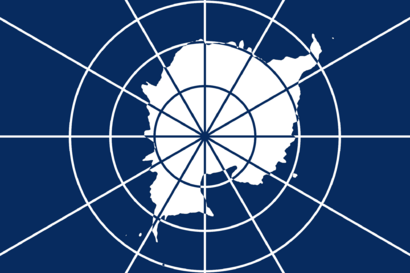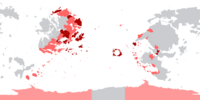Antargic Regulation Treaty of Human Activities
| Antargic Regulation Treaty of Human Activities (Anglish) Traité de Régulation des Activités Humaines en Antargis (Lysian) | |
|---|---|
 | |
| Type | Condominium |
| Signed | September 27, 2017 |
| Location | Deseti island |
| Signatories | Template:Country data TCSI |
The Antargic Treaty, also known as the Antargic Regulation Treaty of Human Activities (ARTHA) or Traité de Régulation des Activités Humaines en Antargis (TRAHA), regulates the geographical integrity of the continent of Antargis, Eurth's most southern continent. The treaty establishes Antargic freedom from harmful human activities, devoid of human ideologies, respect for its soil, and conservation of its environment.
History
The Antargic Treaty, a landmark agreement for the protection and governance of the Antargis region, was officially voted into law during the inaugural Antargic Council meeting in September 2017.[1] This crucial first step paved the way for further dialogues and discussions surrounding the region. By the 2nd meeting of the Antargic Council in January 2019, additional clarifications and amendments were incorporated to address initial ambiguities and provide further detail to the treaty's provisions.[2]
However, the journey of the treaty was not without challenges. The 3rd Antargic Council meeting, held in May 2020, became a flashpoint for debates and criticism. Key areas of contention included the proposed zone management protocols and the perceived exclusion of other pivotal international organisations from the decision-making processes.[3] The collective focus shifted temporarily when global attention was consumed by the outbreak and progression of the Grand War from 2021 to 2023. This major conflict overshadowed other international concerns, leading to a temporary hiatus in the regularity and prominence of the Antargic Council meetings.
Articles of the Antargic Treaty
Prelude
The purpose of ARTHA is to allow the last untouched continent of Eurth, Antargis, to remain free from harmful Human activities, devoid of Human ideologies, respected for its soil, conserved for its environment and brilliant for its future. All Signatories recognise the geographical integrity of the continent of Antargis and vow to respect it.
Guarantees from Nations
The Signatory Nations signing this treaty shall enforce the articles contained in it, valuing them above their own national laws and national interests.
Guarantees from Organizations
The Signatory Organizations signing this treaty shall enforce the articles contained in it before the national interests of one or multiple of its member states or even before their own legislation.
Obligations of the Signatories
The signatory Nations or Organizations agree to the following:
- The prohibition of any non-scientific vessel or human-made vehicle within a 200 km radius around the coastline of Antargis or its floe (see Exceptions for complements);
- The prohibition of any non-scientific human-made object on the continent of Antargis or its floe;
- The prohibition of dispatching any person to the continent of Antargis without a scientific purpose or reason;
- The prohibition of any military projects on the continent of Antargis;
- The prohibition of any physical or moral harm towards any other party involved with Antargis;
- The prohibition of any claim on the continent of Antargis;
Neutrality of the Continent
All humans based on the continent shall apply the legislation of their respective citizenship in concordance with the Venège Convention, prioritising the Venège Convention over all other legislation except if in opposition with the said treaty.
Zone Management
The Antargis Continent shall be defined in 24 zones, each representing one timezone of Eurth. Within these zones, a Nation, Organization or international cooperation shall be appointed Responsible for the environmental protection of the said zone and securitisation from non-scientific or illegal activities, along with respecting the Venège Convention and basic human laws, even above Neutrality of the Continent. Those zones Responsibles shall be defined and appointed during the first conference, and may be removed, amended or added during any conference if a Nation/Organization or international cooperation shall be failing to fulfill this treaty.
Exceptions
In case of an island or other continent already accommodating native inhabitants, Obligations of the Signatories shall be interpreted as follows: applying the Law of the Sea, by considering the continent of Antargis as a sovereign continent and de facto having no authority on further EEZ, the Law of the Sea shall be obligating.
Construction of Scientific Stations
Scientific stations, with the minimal human presence required, maximal automatisation and lowest possible environmental impact, shall be allowed on the continent of Antargis in alignment with the treaty and with the purpose of promoting scientific research and cooperation. Those scientific stations can be built in any zone as long as any Responsible does not veto. If a veto was to be made, the Responsible needs to further explain their reasons. If the veto was to be contested, a mediation shall be initiated.
Signatories
Any Nation or Organization which meets the treaty’s purpose and prerogative may sign it. These parties obligate themselves to work as a community and to work together to uphold the integrity of the continent of Antargis.
Removal of Signature
If any Nation or Organization was to no longer meet the treaty purpose and/or prerogative, the said entity is to be removed from the treaty within the 10 days following an impartial decision made by the appointed investigative commission.
Non-Signatories
Signatories agree to encourage non-Signatories to sign the said treaty.
Non-Signatory Actions
It is the duty of the Responsibles to ensure the safety of their zone. In case of actions violating the said treaty by a non-Signatory, it is the duty of the Responsible to take actions to counter these actions. The Responsible may call for help from other Signatories, and those shall respond in order to ensure its success.
Annual Meeting
An Annual Meeting between representatives of the said treaty shall take place in order to revisit the treaty if needed, consider new possibilities in order to pursue its purpose, and confirm the signature of Signatory parties. An exceptional meeting may be requested at the demand of any signatory, and this one shall take place within the 10 days following the demand. The location of the annual meeting shall be defined during the previous meeting.
Investigative Commission
Impartial investigative commissions may be requested during any meeting by any Signatory, in order to ensure the respect of the said treaty by one of the Signatories or for further purpose aligned with the said treaty. The investigative commission shall consist of a wide spectrum of impartial members, with no affiliations, completely aligned with the said treaty.
Parties
As of 2023, there are 2 international organisations and 2 sovereign states party to the treaty. Several other sovereign states are also claiming parts of Antargis, without ratifying the ARTHA.
- Civil Administration of Oriental States (since 2020), previously Entente of Oriental States (since 2017)
- Girkmand
- Trans-Continental Science Initiative
- Walneria
Antargic Council
Conseil de l'Antargique (Lysian) | |
 Antargic Council | |
| Abbreviation | AC, ANCO |
|---|---|
| Named after | Antargis |
| Formation | September 27, 2017 |
| Founded at | Deseti, Orioni |
| Type | Intergovernmental organisation |
| Legal status | Active |
| Purpose | Forum for promoting cooperation, coordination, and involvement with Antargis |
Executive Secretary | John Hyde (Sep 2017 — Nov 2023) |
Incumbent | TBD |
The Antargic Council was established in Deseti island, Orioni in September 2017 by the signing of the ARTHA. John Hyde (Girkmand) serves as the first Executive Secretary for six years until November 2023. The tasks of the Executive Secretary can be divided into the following areas:
- Supporting the annual meetings of the Antargic Council (AC) and assisting in the preparation and coordination of agendas.
- Facilitating the exchange of information between the Parties required in the ARTHA and ensuring effective communication.
- Collecting and storing the documents of the AC in an organized manner.
- Arranging and publishing relevant documents and reports for the Antargic Council.
- Providing and disseminating public information about the Antargic Treaty system and activities on Antargis.
Meetings
The annual meetings of the Antargic Council are pivotal gatherings that convene stakeholders, representatives, and experts from various parties involved in the governance, research, and conservation of Antargis. These meetings serve as a platform to discuss, review, and shape the future policies, strategies, and collaborations related to the region. Rooted in the principles of the Antargic Treaty system, these yearly convenings emphasize cooperation, transparency, and a shared commitment to preserving the unique environment and ecosystem of Antargis. They have become an indispensable part of the treaty's machinery, ensuring that Antargis remains a zone of peace, science, and international collaboration.
| Date | Location | Refs | |
|---|---|---|---|
| 1st | September 2017 | EOS Headquarters in Deseti, Orioni | [1] |
| 2nd | January 2019 | EOS Headquarters in Deseti, Orioni | [2] |
| 3rd | May 2020 | Røvik Hotel in Canastota, Prymont | [3] |
Area of responsibility
As outlined by the Treaty §6 on Zone Management, the Antargic continent is divided into designed zones for responsible management. The current appointments are as follows:
- Trans-Continental Science Initiative: 165°W to 165°W
- Civil Administration of Oriental States 180°W to 165°W, and 135°W to 180°E
See also
References
- ↑ Jump up to: 1.0 1.1 The Antargic Treaty (September 2017)
- ↑ Jump up to: 2.0 2.1 2nd Antargic Council meeting (January 2019)
- ↑ Jump up to: 3.0 3.1 3rd Antargic Council meeting (May 2020)
